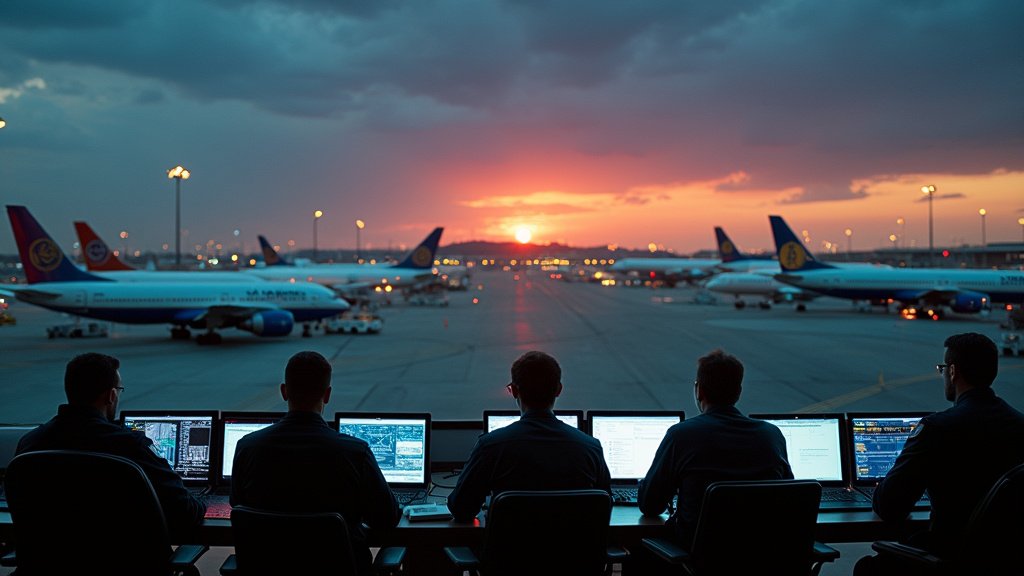LOS ANGELES, CA – October 13, 2025 – Los Angeles International Airport (LAX), a vital gateway for global travel, experienced significant disruptions Sunday when the Federal Aviation Administration (FAA) issued a temporary ground stop due to an equipment outage. The incident, which impacted air traffic coordination systems, forced a halt to all departures and arrivals, causing widespread delays and affecting thousands of travelers. This disruption at one of the world’s busiest airports highlights ongoing vulnerabilities within critical aviation infrastructure, occurring amidst a backdrop of federal staffing shortages and peak holiday travel.
System Glitch Causes Temporary Flight Suspension
On Sunday, October 13, 2025, flight operations at LAX were brought to a standstill after a sudden equipment outage disrupted essential air traffic control systems. The FAA confirmed the ground stop, a safety measure enacted to ensure secure operations, which temporarily suspended all flight movements. While the precise nature of the malfunction remains undisclosed, officials described it as a “systems issue impacting ground control coordination.” The outage, which began around 9 AM PST, prompted immediate action from the FAA, leading to a complete, albeit brief, shutdown of departures and arrivals at the sprawling Los Angeles facility.
FAA and Airport Response to the Outage
Federal Aviation Administration technicians worked swiftly to identify and resolve the technical failure. Airport officials, managed by Los Angeles World Airports (LAWA), confirmed that the outage was “swiftly contained” and that flight operations began to resume gradually as technical teams restored normal functionality. The FAA stated that departures recommenced after thorough safety inspections were completed. Although the FAA did not provide an exact duration for the ground stop, operations were back to normal by Sunday afternoon. This rapid response aimed to mitigate the cascading effects of the disruption across the broader U.S. aviation network.
Ripple Effects on Travelers and Tourism
The temporary grounding of flights at LAX had a significant impact on passengers, many of whom were traveling during the busy Columbus Day holiday weekend. Tourists and business travelers alike faced uncertainty, with many experiencing lengthy delays or flight cancellations. For visitors already in Los Angeles, the disruption meant delayed departures, while those planning to visit the city encountered cancellation notices, potentially disrupting plans to experience the region’s iconic attractions. The incident underscored how even short-lived technical failures at major hubs can create considerable inconvenience, frustration, and stress for those relying on air travel. This disruption also poses a potential setback for Los Angeles’s vital tourism economy, which heavily depends on the smooth flow of visitors into the city.
LAX: A Critical Hub Facing Systemic Challenges
Los Angeles International Airport, the fourth busiest airport globally and the second busiest in the United States by passenger volume, handles approximately 1,500 flights daily. Its critical role in connecting major domestic and international routes means that any disruption can have far-reaching consequences. This latest incident at LAX occurs in a challenging environment for U.S. air travel. Weeks of disruptions have been attributed to ongoing federal government shutdowns that have led to significant air traffic control staffing shortages nationwide. On the Friday preceding the LAX outage, over 6,400 flights were delayed and nearly 470 were canceled across the country, with over 22,000 flights experiencing disruptions since the start of that week. The Columbus Day holiday weekend, traditionally a peak travel period, only exacerbated these existing strains.
Broader Concerns: Infrastructure Vulnerabilities and Past Incidents
The LAX equipment outage has also reignited discussions about the fragility of critical aviation infrastructure. This incident follows closely behind a series of cyberattacks that crippled operations at several European airports, including London Heathrow, Berlin, and Brussels, due to a breach targeting software supplied by Collins Aerospace. While the FAA has indicated the LAX outage was not related to cybersecurity concerns, the repeated instances of significant technical failures underscore the sector’s reliance on complex technological systems that are susceptible to malfunction or attack. Experts and regulatory bodies are increasingly advocating for strengthened cybersecurity protocols and more robust contingency planning to safeguard the global air travel network. The resilience and operational capacity of airports like Los Angeles International are paramount to maintaining traveler confidence and supporting the robust tourism industry that Los Angeles thrives upon. This featured Los Angeles news event serves as a stark reminder of the interconnectedness and delicate balance of modern air travel systems.





